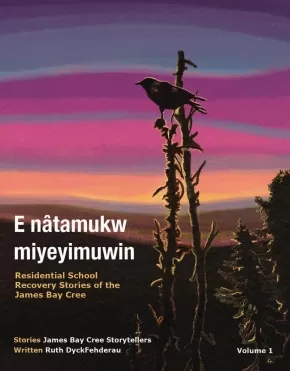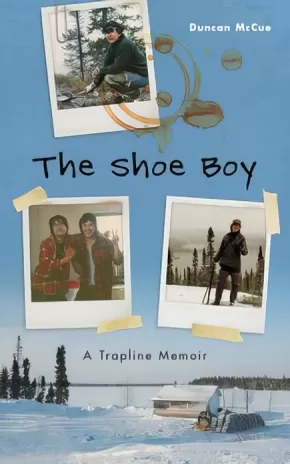James Bay Cree
Synopsis:
In this quietly powerful and deeply human book, Ruth DyckFehderau and twenty-one James Bay Cree storytellers put a face to Canada’s Indian Residential School cultural genocide.
Through intimate personal stories of trauma, loss, recovery, and joy, they tell of experiences in the residential schools themselves, in the homes when the children were taken, and on the territory after survivors returned and worked to recover from their experiences and to live with dignity. The prose is clear and accessible, the stories remarkably individual, the detail vivid but not sensational.
Together they reveal the astonishing courage and strength of children along with the complexity and myriad methods of their oppressors. A tough, often funny, and ultimately uplifting book that’s not quite like anything else out there.
This book is published by Cree Board of Health and Social Services of James Bay and distributed by WLU Press.
Reviews
“These previously unwritten stories of lived, traumatized experiences are testament to the storytellers’ courage and strength and resilience. When the rich Cree traditional and spiritual relationship with land and with family is harmed by separation, hatred, and fear - a harm resulting in anger and loss of values, identity, and self-worth - these storytellers find ways to heal. Through their stories, you learn about culture as treatment, about the power of forgiveness and love, and about peaceful co-existence in community as essential to healing, belief, and advancing true reconciliation.” —Chief Willie Littlechild, Ermineskin Cree Nation, Former Truth and Reconciliation Commissioner, Former residential school student athlete, Order of Canada; Order of Sport, Member of Sports Halls of Fame, Canada and North America
“These Cree stories, told with utmost respect and a feeling of safety, are gifts. They are medicine.” —Joanna Campiou, Woodland/Plains Cree Knowledge Keeper
“This is a difficult but necessary book. There’s a power to truth and to the realities of the Indian Residential School system, but for those wanting to see strength and movement toward hope, this is the book for you. These stories hold that hope close to the heart. What shines through is a love of the land, a love of community, a love of the Cree language, a love of family – exactly what colonial forces like the IRS system tried to destroy but couldn’t.” —Conor Kerr, Metis/Ukrainian author, Avenue of Champions, Giller Prize longlist
Additional Information
320 pages | 7.00" x 9.00" | Paperback
Synopsis:
At the age of seventeen, an Anishinabe boy who was raised in the south joined a James Bay Cree family in a one-room hunting cabin in the isolated wilderness of northern Quebec. In the five months that followed, he learned a way of life on the land with which few are familiar, where the daily focus is on the necessities of life, and where both skill and finesse are required for self-sufficiency.
In The Shoe Boy, that boy – Duncan McCue – takes us on an evocative journey that explores the hopeful confusion of the teenage years, entwined with the challenges and culture shock of coming from a mixed-race family and moving to the unfamiliar North. As he reflects on his search for his own personal identity, he illustrates the relationship Indigenous peoples have with their lands, and the challenges urban Indigenous people face when they seek to reconnect to traditional lifestyles.
The result is a contemplative, honest, and unexpected coming-of-age memoir set in the context of the Cree struggle to protect their way of life, after massive hydro-electric projects forever altered the landscape they know as Eeyou Istchee.
This memoir will be of interest to readers of all ages who want to know more about the interplay of traditional and contemporary Indigenous lifestyles, the challenges of identity for First Nations youth, and the relationship Indigenous peoples have with their land.
Reviews
"Frank, funny and evocative, The Shoe Boy deftly entwines the challenges of identity for First Nations youth, the sexual frustration and hopeful confusion of the teenage years, and the realities of living in an enduring state of culture shock." — CBC Books
"The Shoe Boy is a valuable read and will enrich anyone who tunes in to CBC Radio One on Sunday afternoons, as McCue establishes his voice in the conversation of Canada.— Thomas Billingsley, Globe and Mail
Educator Information
Related Topics: Biography, Memoirs, and Letters; Canadian Studies; Indigenous Studies.
Recommended in the Canadian Indigenous Books for Schools 2020/2021 resource list for grades 9 to 12 for English Language Arts and Social Studies.
Caution: mature language, references to sex, alcohol, and suicide.
Additional Information
88 pages | 5.00" x 8.00"








